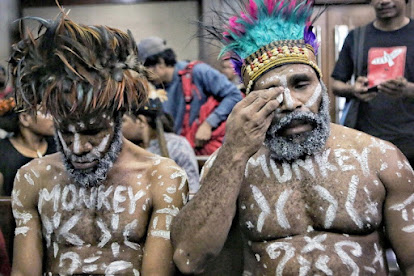Religious Liberty Prayer Bulletin | RLPB 661 | Wed 07 Sep 2022
RLPB is published weekly to facilitate strategic intercessory prayer.
Sign up for, or support, the RLPB at www.ElizabethKendal.com
View RLPB archives at Religious Liberty Prayer Bulletin blog.
For bite-size: follow religiouslibertyprayer on Instagram.
PAPUA, INDONESIA: ENTERING THE ‘END GAME’
By Elizabeth Kendal
BETRAYED AND ABANDONED: After World War Two, Indonesia declared independence from the Netherlands, claiming all the Dutch East Indies as its territory, including ethnic Melanesian and non-Muslim Dutch/West New Guinea. In 1962 (during the Cold War — timeline), the US J.F. Kennedy administration convinced its allies and the UN to legitimise Indonesian rule in the hope that the favour might keep Indonesia out the Soviet sphere of influence. Today, human rights affirming states continue to betray the Papuans – who now are predominantly Christian – by turning a blind eye to Indonesia’s colonisation, militarisation, exploitation and gross human rights abuses in the hope of retaining access to Indonesian markets (especially military markets) and keeping Indonesia out of China’s sphere of influence [NB: it’s not working]. In Papua, as in Iraq, ‘the Christian crisis is existential’. At the root of the problem is the empire’s greed for land and resources, along with a toxic racial-religious (Javanese-Muslim) supremacism that reduces the indigenous Melanesian Christians to despised infidel animals to be removed by any means. [RLPB 636, UN experts call for ‘urgent action’, 9 March 2022.]
 |
| Wearing traditional headdress and protesting racism, Papuan human rights activists Dano Tabuni (right) and Ambrosius Mulait await trial charged with treason for flying the Bintang Kejora (Morning Star) flag in August 2019. (Image: Jakarta Post/Seto Wardhana) In April 2020, Tabuni, Mulait and four other Papuan activitsts were found guilty of treason and sentenced to nine months in jail. |
BUTCHERED: On 26 August residents of Iwaka village, outside the town of Timika – the capital of Mimika Regency along the southern coast of Central Papua – found three mutilated, dismembered bodies in sacks floating down the Pigapu River. The body of a fourth victim – likewise dismembered and stuffed in a sack – was found on 30 August. According to the Indonesian police, at least one of the men was a separatist sympathiser, and the group had approached army personnel looking to buy weapons. [The Indonesian military’s illegal trade in weapons is a whole other story!] According to the police, instead of getting weapons, the Papuans were robbed, murdered, dismembered and disposed of in sacks thrown into the river. The police have promised a full investigation. Meanwhile, in Nduga Regency (a restive area in Highlands Papua), the victims’ families and Nduga’s Regent/head, Namia Gwijangge, tell a totally different story. It has been confirmed that the victims included the Nduga village chief, Irian Nirigi, and Arnold Lokbere, a co-signatory to the village bank account. The two had set out from Nduga for Timika on Monday 22 August to purchase building supplies and agricultural equipment. The two other victims – Atis Tini (23) and Lemaniol Nirigi (29) – had simply gone along for the ride. Gwijangge insists the four men were civilian citizens of Nduga Regency and that the Indonesian military ‘kills civilians in Papua like hunting animals’. Six Indonesian soldiers and three of four wanted civilians have been arrested. Gwijangge is pleading with Papuans not to retaliate and for Indonesia to bring the killers to justice.
 DIVIDED: On 30 June the Indonesian government passed legislation to divide Papua Province into four administrative units, ignoring the will of the Papuan people [RLPB 639, Papuans Protest Planned Division, 30 March 2022]. While West Papua – i.e. the ‘Bird’s Head’ region – will remain unchanged, Papua will be divided into Papua (north coast; capital, Jayapura), Central Papua (capital, Nabire), Highland Papua (landlocked, capital Wamena), and South Papua (capital, Merauke). Adjoining West Papua, Central Papua is destined to become an economic powerhouse for Indonesia. Stretching from Nabire on the province’s north coast to Timika and Mimika Regency on the province’s south coast, Central Papua will encompass the Freeport’s Grasberg gold and copper mine, the Wabu gold deposit, and a long-planned hydro-electric project. Jakarta claims it is working to fix its Papua problem by way of development and improved services. But as Aprila Wayar and Johnny Blades explain (The Diplomat, 21 June): ‘Papua’s problem isn’t lack of development; it’s a lack of justice for West Papuans.’ As Wayar and Blades rightly note, ‘Indonesia’s political elite and military establishment have extensive interests in Papua’s abundant natural resource wealth. The new provincial divisions would enable more opportunities for the exploitation of these resources, largely for the benefit of people other than Papuans themselves.’ There will be more military bases and more human rights abuses as the indigenous ethnic Melanesian, predominantly Christian, Papuans are replaced by Javanese Muslim settlers supported by Indonesian troops. Human rights organisations agree with the Papuans – the division will serve to accelerate Javanese Muslim colonisation, militarisation and exploitation, and hasten the ‘end-game’ of Papuan genocide.
DIVIDED: On 30 June the Indonesian government passed legislation to divide Papua Province into four administrative units, ignoring the will of the Papuan people [RLPB 639, Papuans Protest Planned Division, 30 March 2022]. While West Papua – i.e. the ‘Bird’s Head’ region – will remain unchanged, Papua will be divided into Papua (north coast; capital, Jayapura), Central Papua (capital, Nabire), Highland Papua (landlocked, capital Wamena), and South Papua (capital, Merauke). Adjoining West Papua, Central Papua is destined to become an economic powerhouse for Indonesia. Stretching from Nabire on the province’s north coast to Timika and Mimika Regency on the province’s south coast, Central Papua will encompass the Freeport’s Grasberg gold and copper mine, the Wabu gold deposit, and a long-planned hydro-electric project. Jakarta claims it is working to fix its Papua problem by way of development and improved services. But as Aprila Wayar and Johnny Blades explain (The Diplomat, 21 June): ‘Papua’s problem isn’t lack of development; it’s a lack of justice for West Papuans.’ As Wayar and Blades rightly note, ‘Indonesia’s political elite and military establishment have extensive interests in Papua’s abundant natural resource wealth. The new provincial divisions would enable more opportunities for the exploitation of these resources, largely for the benefit of people other than Papuans themselves.’ There will be more military bases and more human rights abuses as the indigenous ethnic Melanesian, predominantly Christian, Papuans are replaced by Javanese Muslim settlers supported by Indonesian troops. Human rights organisations agree with the Papuans – the division will serve to accelerate Javanese Muslim colonisation, militarisation and exploitation, and hasten the ‘end-game’ of Papuan genocide.
‘Do not stand idly by when your neighbour’s life is threatened’ (Leviticus 19:16b NLT).
PLEASE PRAY THAT OUR MERCIFUL GOD WILL
* intervene for his precious Papuan people to save them; may those who seek to kill and plunder God’s people ‘stumble and fall’ (Psalm 27:2); may those who commit violence be brought to account; may justice prevail; may the wicked no longer enjoy impunity. ‘For nothing will be impossible with God’ (Luke 1:37 ESV).
* move in the hearts of Indonesians, in particular the Indonesian Church: may Indonesian Christians imitate Christ, displaying sacrificial love for their Papuan brothers and sisters; may their love shine bright, exposing the ugliness of toxic racial-religious hatred, causing many to feel shame and desire change.
‘A new commandment I give to you, that you love one another: just as I have loved you, you also are to love one another. By this all people will know that you are my disciples, if you have love for one another.’ (John 13:34-35 ESV)
* raise up voices who will speak up for the Papuans (Proverbs 31:8,9), a betrayed and abandoned Christian people, loved and treasured by a Holy God. Lord have mercy!
SUMMARY FOR BULLETINS UNABLE TO RUN THE WHOLE ARTICLE
——————————————
INDONESIA: ENTERING THE ‘END GAME’ IN PAPUA
On 22 August four Papuans – including two community leaders – left Nduga to purchase building supplies and agricultural equipment in Timika. Instead, their dismembered bodies were found in sacks in a river. Six Indonesian soldiers and three of four wanted civilians have been arrested. Nduga’s Regent/head, Namia Gwijangge, explains that while the four men were civilians, the Indonesian military ‘kills civilians in Papua like hunting animals’. On 30 June the Indonesian government legislated to divide Papua Province into four smaller units, adding Central Papua, Highland Papua and South Papua. West Papua (the ‘Bird’s Head’ region) remains unchanged. Human rights organisations and Papuans agree, the division will serve to accelerate Javanese Muslim colonisation, militarisation and exploitation, and hasten the ‘end-game’ of Papuan genocide. For the predominantly Christian Papuans, the crisis is existential. Please pray.
——————————————
Elizabeth Kendal is an international religious liberty analyst and advocate for the persecuted Church. To support this ministry visit www.ElizabethKendal.com.
Elizabeth has authored two books: Turn Back the Battle: Isaiah Speaks to Christians Today (Deror Books, Melbourne, Australia, Dec 2012) which offers a Biblical response to persecution and existential threat; and After Saturday Comes Sunday: Understanding the Christian Crisis in the Middle East (Wipf and Stock, Eugene, OR, USA, June 2016). She is also an Adjunct Research Fellow at the Arthur Jeffery Centre for the Study of Islam at Melbourne School of Theology.
For more information visit: www.ElizabethKendal.com

